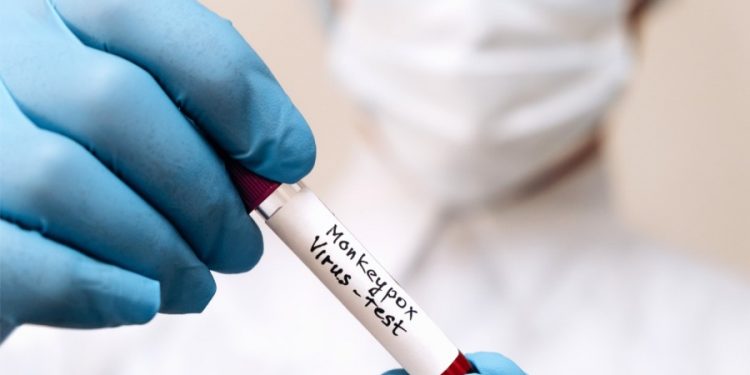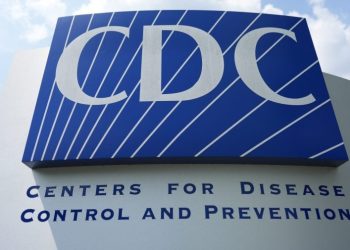Netizens are perhaps rightfully scratching their heads over a Pepsi ad featuring Lindsay Lohan in which the actress enjoys a glass of the soda with just a splash of milk.
Today in health, the Biden administration says it doesn’t anticipate renewing the public health emergency that was declared for the monkeypox outbreak earlier this year once it expires at the end of January.
Welcome to Overnight Health Care, where we’re following the latest moves on policy and news affecting your health. For The Hill, we’re Nathaniel Weixel and Joseph Choi. Subscribe here or in the box below.
White House not expecting emergency renewal
The Department of Health and Human Services (HHS) said Friday it does not expect to renew the public health emergency declaration for the monkeypox outbreak when it expires early next year, citing the low number of cases that are now being reported.
“Given the low number of cases today, HHS does not expect that it needs to renew the emergency declaration when it ends on January 31, 2023. But we won’t take our foot off the gas – we will continue to monitor the case trends closely and encourage all at-risk individuals to get a free vaccine,” Health Secretary Xavier Becerra said in a statement.
HHS said this decision was based on “current data” and added it would “not be afraid” to change course if conditions change in the future.
Like with the COVID-19 public health emergency, HHS had said it would issue a 60-day notice on whether or not it expected to renew the emergency declaration for monkeypox as a courtesy to stakeholders and health care providers.
The declaration was renewed once in November, with Becerra citing the “continued consequences of an outbreak of monkeypox cases across multiple states.”
In its statement, HHS referred to the U.S.’s progress in responding to the monkeypox outbreak as “virtually unheard of.”
“Over the next 60 days we will focus on supporting jurisdictions and the Department to ensure the expiration of the PHE will not hinder response efforts,” the agency noted. “Mpox continues to be a priority for HHS and the Administration more broadly, and we do not expect the expiration of the PHE to impact the Administration’s ability to get vaccinations, tests, and treatments to affected individuals.”
Read more here.
New York state health commissioner resigning
New York State Health Commissioner Mary Bassett announced Friday she will be leaving her post on Jan. 1 and returning to the Harvard University Chan School of Public Health.
“This was a very difficult decision. I have tremendous respect for the work our staff has done during a very difficult year responding to COVID, mpox, polio and the day-to-day challenges of protecting New Yorkers’ health,” Bassett said in a statement.
“I am grateful that the Governor gave me the opportunity to serve as commissioner, and I know that the department and public health will be in good hands thanks to her leadership and the incredible talent and dedication of the staff,” Bassett said about Hochul and her administration in the statement.
A fresh start: Bassett explained in the statement that she chose to resign at the beginning of next year to allow her successor to a chance to lead the state’s “great” health department for “a full 4-year term” under Gov. Kathy Hochul (D).
Hochul beat Republican challenger Lee Zeldin in the race for governor in a closer-than-expected election this November, tightly winning her first full-term to the state’s highest office.
Bassett has served as the state’s top health official for just one year, replacing former New York State Health Commissioner Howard Zucker who stepped down from the post roughly a month after then-Gov. Andrew Cuomo’s (D) departure in disgrace.
Read more here.
VIRTUAL EVENT INVITE
Reimagining the Pharma Supply Chain — Tuesday, Dec. 6 at 1 p.m. ET/10 a.m. AM PT
Natural disasters, war, global supply chain weaknesses and unexpected demand spikes all threaten the nation’s stockpile of pharmaceuticals. How do we ensure our health care manufacturing practices and supply chains are sustainable and able to reach demand? Reps. Buddy Carter (R-Ga.) and Darren Soto (D-Fla.), NAM’s Jay Timmons, Brookings’ Marta Wosińska and BIO’s John Murphy join The Hill to discuss. RSVP today to save your spot.
FEW AMERICANS AWARE OF CANCER RISKS POSED BY ALCOHOL: STUDY
Less than one-third of Americans know liquor can increase the risk of certain cancers, while 25 percent said the same about beer and 20 percent about wine, according to a new study from the American Association of Cancer Research (AACR).
More Americans believe wine decreases cancer risk compared with beer and liquor, and more than half of those surveyed did not know how the beverages affected cancer risk.
Data were gleaned from a nationally representative survey of more than 3,000 U.S. adults carried out in 2020. Findings were consistent regardless of whether respondents drank or not.
“All types of alcoholic beverages, including wine, increase cancer risk,” said lead author William M.P. Klein, associate director of the National Cancer Institute’s Behavioral Research Program, in a release.
Any beverage containing ethanol — including wine, beer and liquor — increases the risk of cancer. Alcohol use accounts for 6 percent of all cancer cases in the U.S. and 4 percent of all cancer deaths, according to the American Cancer Society.
Read more here.
DOCUMENTARY: MATERNAL HEALTH CRISIS IMPACTING BLACK WOMEN
A new documentary is emphasizing how the maternal health crisis disproportionately affects Black women — and how Black women are pushing to end the disparities.
“The nationwide sorority of Black women and sisters coming together to make sure we end this crisis,” Monique Matthews, co-producer of the documentary, told The Hill.
The documentary, “Birthing Justice,” centers on the experiences of Black women and families as they navigate the joys and fears of being pregnant.
The film follows several women in their motherhood journeys as they advocate for themselves and their infants in a medical system that consistently downplays Black patients’ concerns.
The project, along with the work of Black women across the country, is the chance for people to listen to Black women and come together to create better outcomes for everyone, Matthews said.
“To be Black women-led does not mean Black women only,” Matthews explained. “We’re very clear that we want allies. We want people who are involved in the work but who will listen, go to the grassroots level and say what do you need?”
Read more here.
COVID infections rising as new omicron variants spread
New omicron subvariants are rapidly becoming the dominant strain, leading to rising COVID-19 infections and hospitalizations.
The BQ.1.1, BQ.1 and XBB subvariants combined accounted for about 68 percent of all cases in the U.S. through Dec. 3, according to the Centers for Disease Control and Prevention (CDC). That was up from about 61 percent of cases in the week through Nov. 26.
Nationwide hospitalizations have increased 20 percent over the previous week and stand at 4,378 according to the CDC.
The rising cases caused by the subvariants comes as the Food and Drug Administration this week said the COVID-19 monoclonal antibody treatment bebtelovimab from Eli Lilly is no longer authorized, because it not expected to be effective against BQ.1.1 and BQ.1.
At the same time, Los Angeles County may reimpose an indoor mask mandate. Community transmission has reached “medium” levels, and the county will require face coverings if it reaches the levels the CDC deems “high.”
WHAT WE’RE READING
The business of clinical trials is booming. Private equity has taken notice (Kaiser Health News)
‘The hospital never supported the midwives’: As more birth centers open, their viability hinges on nearby hospitals (Stat)
Neurologists say accelerated brain aging in Black people can be countered by lifestyle changes (NBC News)
STATE BY STATE
In Philadelphia, ‘tranq’ is leaving drug users with horrific wounds. Other communities are bracing for the same (Stat)
Oregon Health Authority bringing in dozens of contract nurses for children’s hospitals (Oregon Capital Chronicle)
Alabama firefighters receive funding to expand mental health services (WAFF)
That’s it for today, thanks for reading. Check out The Hill’s Health Care page for the latest news and coverage. See you next week!















